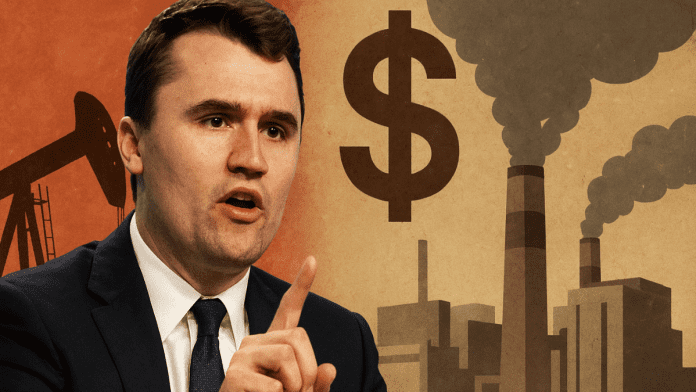🕒 Last updated on September 19, 2025
Charlie Kirk’s rise to fame was not only about his loud voice or strong opinions. Behind the scenes, powerful money was at work.
Big Oil’s Hidden Hand in Building His Platform
Some of the biggest players in the fossil fuel industry gave him the push he needed to stand out. This is why many people call him a plant—someone whose success was not fully organic but grown with the help of hidden corporate funding.
Kirk’s group, Turning Point USA, became a loud voice on college campuses. The group claimed to represent young conservatives, but much of its growth came from money that was far from youthful or grassroots. Reports showed that in 2020 alone, the group brought in about $40 million, and nearly half of that came from just ten anonymous donors.
Kirk himself admitted that some of those secret donors came directly from the fossil fuel world. He even revealed that he raised money at meetings held by powerful oil and mining associations. At those gatherings, he promised energy executives that he would fight against the so-called “myth” that fossil fuels are dirty and that he would challenge professors who taught about pollution and climate science.
JD Vance’s hometown steel mill drops green project after Trump’s clean energy cuts
The meetings were a success for Kirk. Not only did he secure support, but leaders from the oil industry also joined his advisory council. That connection ensured his group would remain tied to Big Oil for years to come.
Spreading Climate Denial Through Conspiracies
Once Kirk had the backing, he worked hard to spread doubt about climate change. He crafted a message asserting that science was still in a state of debate. He often said that climate policies were nothing more than a secret attempt by governments to control people’s lives. In one of his speeches, he called the push for a green economy “a tyrant’s fantasy,” saying it would take away private property and basic freedoms.
To support these claims, Kirk leaned on people he described as experts. But many of them were not qualified climate scientists. For example, he repeated arguments from television weather presenters and even an old Nobel Prize winner whose work had nothing to do with climate science. These voices gave him quotes he could use, but they did not represent the majority of real researchers in the field.
While thousands of climate scientists published evidence about rising global temperatures and the risks of pollution, Kirk dismissed their work as “garbage.” He painted climate warnings as political tools instead of facts. Over and over, he told his audience that the science was fake, ignoring the actual experts who had studied the issue for decades.
This pattern continued right up to his final interview. Just weeks before his death, Kirk sat down with a former energy official who had commissioned a controversial climate report. The report downplayed the dangers of climate change, and Kirk praised it loudly. He said any criticism of the report was only political. But what he did not mention was that more than 80 climate scientists had published a detailed rebuttal, exposing errors, cherry-picking of data, and misuse of citations.
💨 Trump calls wind turbines “ugly” and a “con job” in fiery rant against renewable energy
Even then, Kirk refused to accept the idea of scientific consensus. He told his audience that “science does not have consensus,” claiming that science itself is silent and only individual scientists speak. But what he ignored was that nearly all publishing climate scientists have been saying the same thing for decades: burning fossil fuels is heating the planet and putting life on Earth at risk.
The Link Between Climate Denial and Extremism
Kirk’s message was not just about the climate. He used the same platform, built with fossil fuel money, to spread other divisive ideas. He often attacked civil rights, spoke against women’s equality, and mocked the rights of LGBTQ+ people. These messages worked together, building a base that combined climate denial with other forms of extremism.
For the fossil fuel industry, this mix was useful. As long as Kirk and others like him spread the idea that “climate change is fake,” the companies selling oil, coal, and gas benefited. They did not care about the other parts of his message, whether it was about race, gender, or culture wars. What mattered most was that their business model—selling fossil fuels—remained unquestioned.
This is why so many people now point to the inseparable connection between climate denial and right-wing extremism. By funding voices like Kirk’s, fossil fuel companies were not just shaping opinions about energy. They were also fueling a broader movement of anger and division.
$1.5B offshore wind farm in turmoil after Trump shifts support to fossil fuels
Racism, sexism, and transphobia became tools to grow the same audience that was told climate change is not real. That audience was then easier to rally against environmental laws, clean energy projects, and any policies that threatened fossil fuel profits.
Charlie Kirk’s story shows how money from the fossil fuel industry can shape not only the climate debate but also the wider culture. His success was not only about his words or his charisma. It was deeply connected to powerful industries that stood to lose if the world acted seriously on climate change.

